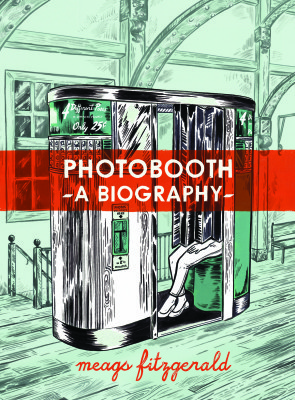People have squeezed into them, kissed in them, brought props and costumes and pets into them. Andy Warhol had commercial success with them. Amélie Poulain chased a man around Paris because of them. Even the Mafia used them.
Nearly 100 years old, chemical photobooths are rarely given their due importance in photographic history, and now they’re quietly vanishing from our public spaces. As early as next summer, digital booths may be our only option for impromptu four-frame photo shoots.
This history is just some of what Photobooth: A Biography has to offer. In her graphic novel debut, writer, illustrator, and self-described “photobooth geek” Meags Fitzgerald draws back the curtain on an industry in flux and shares her own relationship with the machines.

Photobooth
A Biography
Meags Fitzgerald
Conundrum Press
$20.00
paper
280pp
978-1-894994-82-8
The novel opens with history lessons: the rise and demise of early photobooth prototypes, the story of the man who invented the photobooth as we know it today, as well as the early days of Fitzgerald’s photobooth courtship. While detail heavy, it certainly isn’t dull; Fitzgerald puts a lot of effort into keeping the facts fascinating and the jargon accessible.
It also reads with a sense of urgency. The production of colour photobooth paper ceased in 2007 and the supply is projected to run out by next summer. Fitzgerald completed this project as quickly as she could with the hope of encouraging people to experience the booths firsthand before they disappear entirely and, perhaps, to reverse their fate.
And yet, Photobooth isn’t simply a heartfelt historical memoir or a compelling preservation campaign. It also explores the darker and philosophical sides of these machines. One moment Fitzgerald will be conflicted about the use of a known carcinogen in the developing process and the next she’ll be waxing poetic on the motivations and desires of collectors. Fitzgerald shares her experiences of the booths as confessionals, time machines, and sanctuaries; her relationship with them is so intimate it’s as if – as she concluded herself – she’s written this memoir about one of her dearest friends.
Largely composed in black and grey ink, Photobooth is brimming with detailed illustrations of photo strips from her own collection and with full-page portraits of historical and contemporary booths. It often feels more like a travel scrapbook than your typical graphic novel. For the most part, this stylistic decision complements the subject matter; tossing the six-panel-per-page standard out the window gave Fitzgerald the freedom to cut and paste and arrange to her liking. The words gently fill the space left by the illustrations and the pages still have plenty of room to breathe.
What this book occasionally lacks in tightness, it more than makes up in timeliness and heart. Fitzgerald pulls off what our favourite teachers seem to do effortlessly: ease us into loving a subject we couldn’t have imagined falling for.
“Do you really think a book could change the course of [the photobooth’s] fate?” Fitzgerald wonders near the end.
Time and again, history has proven that technology waits for no one. Yet Photobooth will have you rooting for the vintage machines. Perhaps this little gem will help transform their imminent fate to become artifacts in beautiful and unpredictable ways. mRb






0 Comments